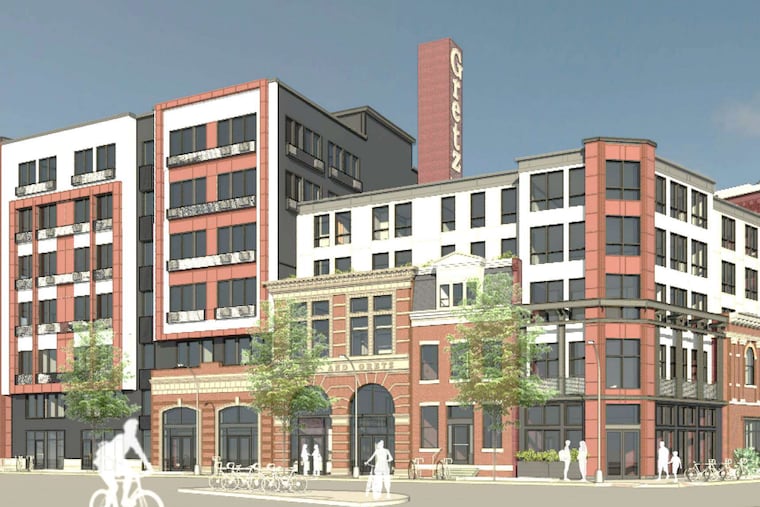Redevelopment of Gretz Brewery in Kensington is back on track
The Kensington apartment boom continues with a revived, and slightly shrunken, proposal to turn the old Gretz brewery into a residential complex.

A redevelopment plan for the former Gretz Brewery at 1524-38 Germantown Ave. is being revived after years of dormancy.
The developer, Conshohocken-based Rufo Cos., received zoning permission for the development before the pandemic, but progress stalled in the years thereafter, and the permits expired.
“There were a couple extenuating circumstances with the previous one, including COVID and things like that, so we’re going back through the approval process,” said Tony Rufo Jr., a principal with the company.
The original proposal received pushback for being overly dense. The new plan reduces the unit count from 220 to 200. Half of them will be one-bedrooms, Rufo Jr. said. Also, one of the new additions to the brewery complex will be reduced by a story, and the company is negotiating with neighborhood groups about the placement of the drive aisle for the complex.
The number of parking spaces, 42, will remain the same as will the space allotted for five retail storefronts.
In the years since its initial approval, the neighborhood around the Gretz Brewery project — directly west of Fishtown — has seen an influx of new development and population. Competition among new multifamily buildings is intense right now, although the current apartment glut is expected to fade within the next two years.
“We see what has happened over the last five years in that area, but I think we’re strategically placed in that we have an historical property that will set us apart from all these new builds,” Rufo Jr. said. “I don’t think it’ll be as transient as some of the other ones, with one-year leases and then the tenants are out. This will be a place where people will stay for multiple renewals.”
While Rufo is apparently moving forward with the redevelopment of the Gretz Brewery, the building was listed for sale for $6.6 million earlier this month.
But Rufo Jr. insists that the company is serious about its redevelopment proposal.
“Yes, it’s currently on the market but not necessarily for sale,” Rufo Jr. said. “Our intention is to get this property developed and occupied.”
For historic preservationists, the revitalization of the brewery, which has been vacant for 65 years, would be a huge win. The building is on the local register of historic places, which means it is protected from demolition. But the longer it sits empty, the tougher redevelopment becomes.
“It’s an all too rare example of Philadelphia leveraging its industrial heritage,” said Paul Steinke, executive director of the Preservation Alliance. “Philadelphia was once the leading brewery city in the country before Prohibition, and this is a relic of that. We’re always happy to see when our industrial history is celebrated in this way.”